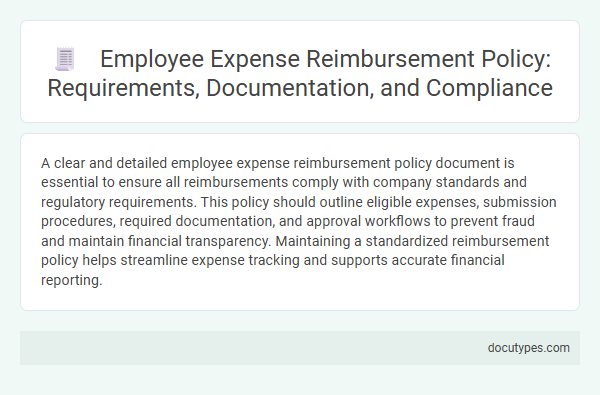A clear and detailed employee expense reimbursement policy document is essential to ensure all reimbursements comply with company standards and regulatory requirements. This policy should outline eligible expenses, submission procedures, required documentation, and approval workflows to prevent fraud and maintain financial transparency. Maintaining a standardized reimbursement policy helps streamline expense tracking and supports accurate financial reporting.
Introduction to Employee Expense Reimbursement Policy
An Employee Expense Reimbursement Policy outlines the procedures employees must follow to claim business-related expenses. This policy ensures that reimbursements are handled consistently and comply with company and regulatory requirements. Clear documentation within this policy helps prevent errors and supports financial accountability.
Policy Scope and Eligibility
Employee expense reimbursement policies clearly define the scope and eligibility criteria to ensure consistent and compliant processing of employee claims. These policies outline which expenses qualify for reimbursement and specify the employee roles eligible to submit claims.
- Policy Scope - Defines the types of expenses covered, including travel, meals, and office supplies necessary for business activities.
- Eligibility Criteria - Specifies which employees, such as full-time, part-time, or contractors, are entitled to submit reimbursement requests.
- Documentation Requirements - Details the necessary policy documents, such as receipts and approval forms, required to process reimbursements accurately.
Clear policy documentation helps maintain transparency and control over employee expense reimbursements.
Types of Reimbursable Expenses
Employee expense reimbursements require a clear policy document that outlines the types of expenses eligible for reimbursement. This ensures transparency and consistency in managing company finances.
- Travel Expenses - Reimbursable travel costs include airfare, hotel stays, and local transportation needed for business purposes.
- Meal Expenses - Meals incurred during business trips or client meetings are covered when properly documented with receipts.
- Office Supplies - Purchases of essential office supplies needed to perform job duties qualify for reimbursement under company policy.
Non-Reimbursable Expenses
A clear policy document outlining employee expense reimbursements is essential for managing company finances and ensuring transparency. This document must specify which expenses are eligible for reimbursement and explicitly list non-reimbursable expenses such as personal purchases, alcohol, and luxury items. Defining these guidelines helps prevent misunderstandings and supports consistent enforcement of company spending rules.
Expense Submission Procedures
Employee expense reimbursements require a clearly defined policy document outlining the expense submission procedures. This document ensures transparency, compliance, and accurate processing of reimbursement claims.
The policy must specify the types of expenses eligible for reimbursement and the required supporting documents, such as receipts and approval forms. Employees should submit expense reports within a designated timeframe, following a standardized format to facilitate efficient review. Adhering to these procedures minimizes errors and accelerates reimbursement timelines.
Required Documentation for Reimbursement
Required documentation for employee expense reimbursements ensures transparency and compliance with company policies. This documentation typically includes original receipts, detailed expense reports, and approval forms.
You must submit accurate and complete records to avoid delays in the reimbursement process. Policies often mandate timely submission of these documents to validate the legitimacy of expenses.
Approval and Processing Guidelines
A clear policy document outlining approval and processing guidelines is essential for employee expense reimbursements. This document specifies the required approval hierarchy to ensure proper authorization before any reimbursement is processed.
The policy details the submission process, including necessary documentation and timelines to prevent delays. You must follow these guidelines to guarantee compliance and timely reimbursement of valid expenses.
Compliance with Legal and Tax Regulations
Employee expense reimbursements require specific policy documents to ensure compliance with legal and tax regulations. These documents protect both the employer and employee by providing clear guidelines and audit trails.
- Expense Report Form - A standardized form that details the nature and amount of expenses incurred by the employee.
- Receipts and Invoices - Original or digital proof of purchase is mandatory to validate the legitimacy of each reimbursed expense.
- Compliance Policy Document - A comprehensive document outlining adherence to tax laws and company expense reimbursement rules.
Roles and Responsibilities of Employees and Managers
| Policy Document Required | Employee Expense Reimbursement Policy |
|---|---|
| Purpose | Defines the criteria, process, and documentation required for reimbursing employees for work-related expenses. |
| Roles and Responsibilities: Employees |
|
| Roles and Responsibilities: Managers |
|
| Compliance Requirements | Policy must align with organizational finance rules, legal regulations, and tax guidelines to ensure valid reimbursements. |
What Policy Document Is Required for Employee Expense Reimbursements? Infographic

